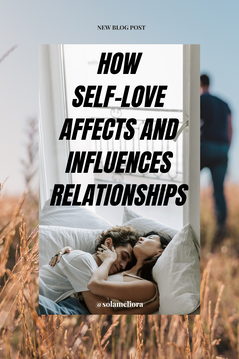|
If one does not have self-love, there is much that can go wrong in a relationship. Without self-love, one may be unable to set healthy boundaries and communicate assertively, leading to misunderstandings, conflicts, and resentment. One may also be unable to have authentic and honest connections with others, leading to mistrust and disconnection in the relationship. Without self-love, one may depend on others for validation and approval, leading to codependency and enmeshment in the relationship. One may also be unable to be compassionate and empathetic towards others and may hold on to grudges and resentment, which can lead to conflict and resentment in the relationship. Finally, without self-love, one may be unable to have balanced and equal relationships and may be attracted to unhealthy and toxic relationships, leading to unhappiness and dissatisfaction. Lacking self-love can lead to many problems and challenges in relationships and prevent one from having healthy and fulfilling relationships. 10 Reasons why Self-Love is important for a Healthy Relationship
Self-love allows one to set healthy boundaries and communicate assertively in relationships. When one has self-love, one knows one's own limits and needs and can communicate them clearly and confidently to others. This allows one to say "no" when necessary and to stand up for oneself without being aggressive or passive-aggressive. It also means listening to others, respecting their boundaries and needs, and having open and honest discussions about difficult topics. This leads to healthier and more balanced relationships where both partners feel respected and valued. Additionally, being able to communicate assertively helps to prevent misunderstandings and conflicts and to resolve them when they do arise. It also allows for greater intimacy and connection, as both partners can be honest and authentic. Self-love enables one to have more authentic and honest connections with others. When one has self-love, one can be authentic and true to oneself and not pretend to be someone one is not. This allows one to be vulnerable and transparent and to share one's thoughts, feelings, and experiences with others genuinely and sincerely. This leads to deeper and more meaningful connections with others, where one can be oneself and be accepted for who one is. It also means being open to feedback and criticism and willing to learn and grow from them. This leads to more authentic and honest relationships where both partners can grow and evolve together. Additionally, having authentic and honest connections allows for greater trust and intimacy in relationships, as both partners can be open and vulnerable with each other. Finally, it also allows for greater support and understanding, as both partners can be there for each other in times of need. Self-love allows one to be more confident, self-assured, and less dependent on others for validation. When one has self-love, one believes in oneself and one's abilities and has confidence in one's own worth and value. This allows one to feel good about oneself and not constantly seek validation or approval from others. It also means handling rejection and criticism and not letting them define one's self-worth. This leads to more confident and self-assured individuals who are less dependent on others for validation and more able to stand on their own feet. Additionally, having confidence and self-assurance allows for greater independence and self-sufficiency, as one can rely on oneself and one's abilities rather than constantly seeking the approval or validation of others. Finally, it also allows for greater resilience and adaptability, as one can handle challenges and setbacks without letting them shake one's confidence and self-worth. Self-love allows one to be more compassionate and empathetic towards others and to forgive and let go of grudges. When one has self-love, one treats oneself with kindness and compassion and extends that kindness and compassion towards others. This allows one to be more empathetic and understanding towards others and to be able to see things from their perspective. It also means being able to forgive and let go of grudges and not holding on to past hurts and resentment. This leads to more compassionate and empathetic individuals who can build strong and supportive relationships. Additionally, forgiving and letting go of grudges allows for greater inner peace and well-being, as one is not carrying around the burden of resentment and anger. It also allows for greater harmony and harmony in relationships, as one can move past conflicts and misunderstandings and rebuild trust and connection. Self-love allows one to have more balanced and equal relationships where both partners are happy and fulfilled. When one has self-love, one can have more balanced and equal relationships where both partners are happy and fulfilled. This means communicating one's needs and boundaries and respecting the needs and boundaries of others. It also means giving and receiving love and support and not being overly dependent on the relationship for happiness and fulfilment. This leads to happier and more fulfilling relationships where both partners feel valued and supported and can grow and evolve together. Additionally, having balanced and equal relationships allows for greater satisfaction and happiness in life, as one is not sacrificing one's own needs and wants for the sake of the relationship. It also allows for greater trust and connection in relationships, as both partners can be honest and open with each other and support each other in their individual growth and development. Self-love allows one to attract and be attracted to healthy and supportive relationships. When one has self-love, one can attract and be attracted to healthy and supportive relationships. This means being confident and self-assured and not settling for relationships that are not supportive or fulfilling. It also means being clear about one's boundaries and needs and not compromising them for the sake of the relationship. This leads to more satisfying and fulfilling relationships where both partners can support and encourage each other's growth and happiness. Additionally, being able to attract and be attracted to healthy and supportive relationships allows for greater happiness and well-being, as one is not stuck in toxic or unfulfilling relationships. It also allows for greater personal growth and development, as one can learn and grow from healthy and supportive relationships and become a better and happier person. Self-love allows one to be more independent and self-sufficient and less codependent or enmeshed in relationships. When one has self-love, one can be more independent and self-sufficient and less dependent on others for one's happiness and fulfilment. This means relying on oneself and one's abilities and not needing others to validate or approve of one's choices and actions. It also means handling one's own emotions and needs and not overly reliant on others to meet them. This leads to more independent and self-sufficient individuals who are less codependent or enmeshed in relationships and more able to stand on their own feet. Additionally, being more independent and self-sufficient allows for greater freedom and autonomy in relationships, as one is not tied to the needs and expectations of others. It also allows for greater happiness and fulfilment in life, as one can pursue one's dreams and goals rather than being held back by the needs and expectations of others. Self-love allows one to be more self-aware and self-aware and to recognize and address one's own emotional needs. When one has self-love, one can be more self-aware and self-aware and to have a better understanding of one's own thoughts, feelings, and needs. This allows one to recognize and address one's emotional needs and take care of oneself in a healthy and nurturing way. It also means being able to recognize and validate one's own emotions and not dismissing or denying them. This leads to more self-aware individuals who can better take care of themselves emotionally and build healthy and supportive relationships. Additionally, being more self-aware and self-aware allows for greater emotional intelligence and resilience, as one can navigate one's emotions and those of others healthily and effectively. Finally, it also allows for greater happiness and well-being, as one can address one's emotional needs and care for oneself in a healthy and nurturing way. Self-love allows one to be more resilient and adaptable in relationships and to handle conflicts and challenges. When one has self-love, one can be more resilient and adaptable in relationships and handle conflicts and challenges healthily and effectively. This means being able to bounce back from setbacks and challenges and not letting them derail one's relationships or happiness and well-being. It also means adapting and adjusting to changing circumstances and not being rigid or inflexible in one's approach to relationships. This leads to more resilient and adaptable individuals who can navigate the ups and downs of relationships and maintain their own happiness and well-being in the process. Additionally, being more resilient and adaptable allows for greater flexibility and adaptability in relationships, as one can roll with the punches and not be thrown off by conflicts and challenges. Finally, it also allows for greater stability and security in relationships, as one can weather storms and challenges and become stronger on the other side. Self-love allows one to be more authentic and true to oneself and to be happy and content in one's own life, regardless of the state of one's relationships. When one has self-love, one can be more authentic and true to oneself and be happy and content in one's own life, regardless of the state of one's relationships. This means embracing one's own unique qualities and quirks and not trying to fit into a mould that is not authentic to oneself. It also means finding happiness and fulfilment in one's own life and not relying on others or relationships to make one happy. This leads to more authentic and true individuals who can be themselves and be happy and content in their own lives, regardless of the state of their relationships. Additionally, being more authentic and true to oneself allows for greater inner peace and well-being, as one is not constantly trying to be someone one is not. It also allows for greater satisfaction and fulfilment in life, as one can pursue one's own dreams and goals and be happy and content in one's own life. In conclusion, self-love is vital for a healthy and fulfilling relationships. It enables healthy communication and boundaries, confidence, compassion, balanced relationships, attraction to healthy relationships, independence, self-awareness, resilience, and authenticity. Self-love is the foundation of healthy relationships and is essential for happiness and well-being. We would love to hear from you, how do you express self-love?
0 Comments
Leave a Reply. |
AuthorMona is a versatile writer with experience in both fiction and non-fiction. She deeply loves the written word and is always seeking new and exciting ways to explore the human experience through her writing. Archives
January 2024
Categories
All
|


 RSS Feed
RSS Feed